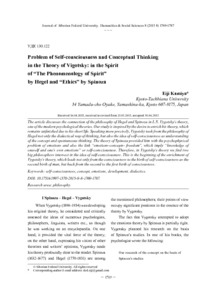Problem of Self-consciousness and Conceptual Thinking in the Theory of Vigotsky: in the Spirit of “The Phenomenology of Spirit” by Hegel and “Ethics” by Spinoza
Скачать файл:
URI (для ссылок/цитирований):
https://elib.sfu-kras.ru/handle/2311/19743Автор:
Kamiya, Eiji
Камия, Эйдзи
Дата:
2015-08Аннотация:
The article discusses the connection of the philosophy of Hegel and Spinoza in L.S. Vygotsky’s theory,
one of the modern psychological theories. Our study is inspired by the desire to enrich his theory, which
remains unfinished due to his short life. Speaking more precisely, Vygotsky took from the philosophy of
Hegel not only the dialectical way of thinking, but also the idea of self-consciousness as understanding
of the concept and spontaneous thinking. The theory of Spinoza provided him with the psychophysical
problem of emotions and also the link “emotions-concepts- freedom”, which imply “knowledge of
oneself and one’s own emotions” or self-consciousness. Therefore, in Vygotsky’s theory we find two
big philosophers intersect in the idea of self-consciousness. This is the beginning of the enrichment of
Vygotsky’s theory, which leads not only from the consciousness to the birth of self-consciousness as the
second birth of man, but back from the second to the first birth of consciousness В статье раскрывается, как философии Гегеля и Спинозы связаны с самой глубиной
теории Л.С. Выготского (1896-1934), которая продолжает жить как одна из современных
психологических теорий. Наша мотивация такого изучения заключается в том, чтобы
обогатить теорию Выготского, находящуюся незаконченной из-за краткости его жизни.
Иными словами, из философии Гегеля Выготский принял не только диалектический способ
мышления, но идею самосознания как осознание понятия и произвольное мышление. В теории
Спинозы же он рассмотрел психофизическую проблему об эмоциях и одновременно связи
«эмоций – понятии – свободы», суть которых заключает в себе «познание о себе и о своих
аффектах», или самосознание. Таким образом, исходя из идей Выготского, мы находим, что
два крупных философа подлинно пересекаются в идее самосознания. Это начало в таком
пути обогащения теории Выготского, которое идет не только от рождения сознания
к самосознанию как второму рождению человека, но и обратно – от второго к первому
рождению сознания

